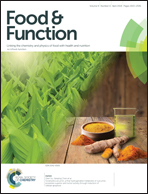Modulation of whey protein-kappa carrageenan hydrogel properties via enzymatic protein modification
Abstract
Treatment of whey protein isolate (WPI; 1 to 25% w/w) in heated κ-carrageenan (KC; 2% w/w) slurries with protease and/or transglutaminase modulated the properties of the hydrogels formed after cooling. Observation of peak compression stress and strain at gel rupture showed WPI incorporation at 1, 5 and 10% (w/w) significantly reduced the strength and deformability of 2% (w/w) KC gels. Treatment of WPI solutions in KC slurries with Alcalase 2.4L was shown by both SDS-Page and size exclusion HPLC to reduce protein/peptide molecular weight distributions below 10 kDa, with large portions below 1 kDa. This peptide size reduction within the KC matrix produced more translucent gels with a more organized wall and cell structure as observed by SEM, which resulted in gels with observed rupture stress/strain levels similar to 2% KC alone. Transglutaminase treatment of WPI-KC slurries showed the reverse behavior, reducing gel translucency, strength and deformability. At these loadings, WPI-KC gel strength/deformability appears to relate decreasing peptide size to gel behavior trending towards KC-only gels; suggesting peptide size modulation in protein-carbohydrate complexes will allow significant tailoring of texture for the delivery of protein/peptide rich gelled products.



 Please wait while we load your content...
Please wait while we load your content...